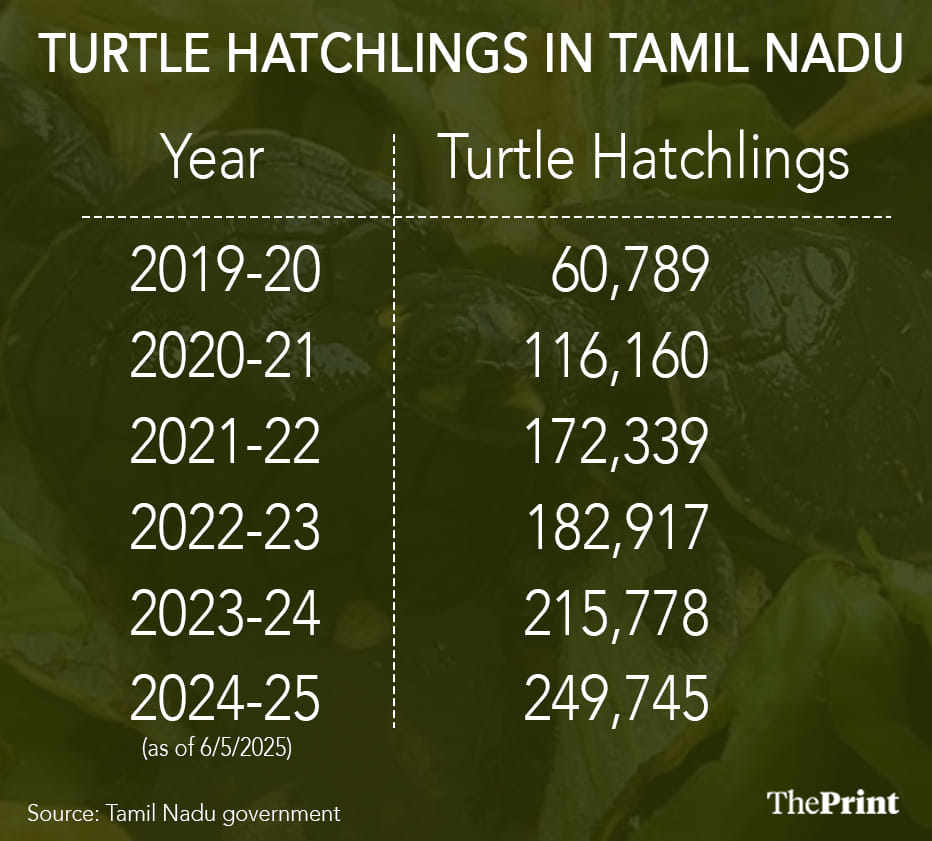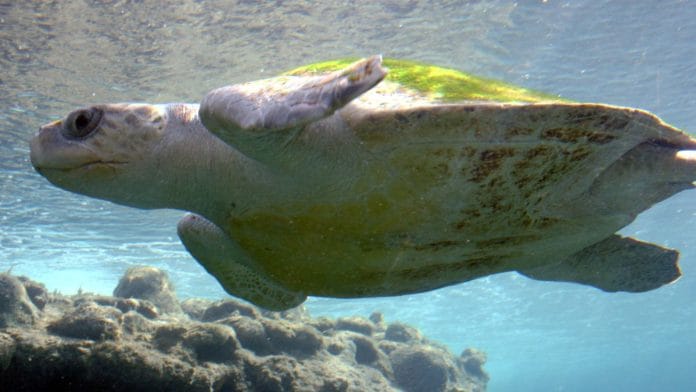New Delhi: Tamil Nadu has set an unprecedented record in sea turtle conservation. More than three lakh Olive Ridley eggs have been collected, and over 2.49 lakh hatchlings have been recorded on its beaches so far this year, with more expected as the season is likely to continue till June. Chennai and Cuddalore have led the season with the highest number of egg collections.
While a high number of Olive Ridley turtle births is always welcome, it holds particular importance this year. The breeding season began with grim news in February, as more than 1,000 dead turtles washed up on Chennai’s shores. Bottom trawling and unregulated fishing close to shore led to the highest turtle mortality in Tamil Nadu in decades, according to wildlife experts.
However, the Tamil Nadu state government responded swiftly by establishing a task force, increasing monitoring and protection on the beaches, and engaging actively with fishermen and the fisheries department.
“The season was off to a tough start, with unprecedented turtle deaths on our shores. But now, we’re delighted to inform that the season has completely turned over,” said Supriya Sahu, the Additional Chief Secretary (ACS) of Environment, Forests and Climate Change for the Government of Tamil Nadu.
The annual Olive Ridley turtle season witnesses thousands of these endangered creatures emerge from the sea onto the shores of Tamil Nadu, Andhra Pradesh and Odisha to lay their eggs between February and May. After 45 to 60 days, the eggs hatch, and the tiny hatchlings make their way back to the ocean.
Due to their vulnerability to fishing nets, shore predators, and human disturbances, local communities, non-governmental organisations (NGOs), and state forest authorities often assist in ensuring the turtles’ survival during the hatching season. They implement trawling bans near shore, mandate Turtle Excluder Devices (TEDs) on fishing boats, and organise protection drives where eggs are collected and hatchlings are guided safely to the sea.
State governments and the Indian Coast Guard actively support Olive Ridley conservation across India’s coastlines. In Tamil Nadu this year, over 60 hatcheries spread across beaches in nine districts undertook the collection and hatching of eggs, with more than 200 forest department staff dedicated to the task.
“Turtle conservation is going to take huge leaps in our state, and it’s already visible in this year’s hatchlings,” said Sahu. “Yes, the turtle deaths were a setback, but importantly, we took steps to address them and learned our lesson right away.”

Also Read: Search for an Indian Carl Sagan is on. Science influencers are being trained in labs and likes
Threats to Ridley turtles
Sahu, who joined Tamil Nadu’s forest department as ACS in February this year, recalls how she was immediately confronted with the challenge of turtle deaths. Witnessing turtle carcasses washing up on beaches in Tamil Nadu and even Andhra Pradesh served as a wake-up call for urgent action.
The department’s first step, explained Sahu, was to enhance coordination with other government departments involved in monitoring and protecting the turtles. This included the fisheries department and local municipal corporations responsible for beach maintenance.
“Also, we reached out to fishermen communities ourselves to understand what was causing the turtle deaths and to create awareness,” said Sahu. “They are usually champions of conservation; they just need to be told how to go about it.”
Most of the dead Olive Ridley turtles discovered on beaches had died from drowning, which occurs when they become entangled in fishing nets and cannot reach the surface to breathe. During the nesting season, Tamil Nadu enforces a fishing ban within five nautical miles of the shore to allow turtles safe access to the beach. Additionally, this year the government began subsidising TEDs for fishing boats, enabling turtles to escape the nets if they are accidentally caught.
“More than two lakh turtles will make their way to the ocean from Tamil Nadu this year, and we are still counting,” said Sahu excitedly. “It is historic for us and demonstrates our commitment to protecting these turtles.”
(Edited by Radifah Kabir)
Also Read: 47 yrs ago, this Indian-origin physicist asked Feynman a question. He hasn’t looked back since






